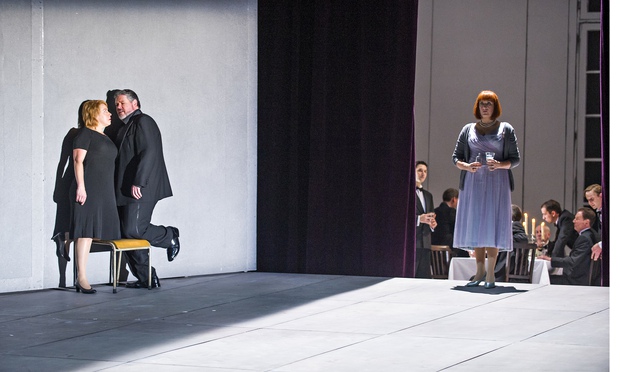My
critical view of Christof Loy’s acclaimed production of Tristan und Isolde is
slightly marred by where I was sitting in conjunction to the Royal Opera House's stage –
literally five meters away from Wagnerian Soprano Nina Stemme who won a
Laurence Olivier Award for her performance as Isolde at its premier in
2010.
Having
witnessed her vocal prowess and first-class performance at this year's Proms as
an audacious Salome, my expectations were only skyrocketing for an opera said to
be ‘intoxicated by passion almost to the point of depravity.’ Wagner, unlike
other composers, wrote the libretto and poetry to his operas where ‘words, stage
setting, visible action and music all come together in closest harmony towards
the central dramatic purpose’ (otherwise termed as Gesamtkunstwerk
(total art-work)).
And here Stemme’s role as the heroine plays as much a significant part as Antonio
Pappano’s conducting of the orchestra of the Royal Opera House.
In
this four hour production Loy’s minimal setting, which is limited to walls, two
chairs and a table, puts the onus on Pappano, the orchestra and the cast
members’ vocal craft to evoke the drama on to the opera; in the back a
parallel world: banquet of debauchery, is concealed by curtains that supposedly
represent Wagner’s metaphysical influences from philosopher Schopenhauer and
the yearning of endless night, darkness and even death. Although known for controversial productions, Loy's effective stage
decision, here, is one that I fully support.
The preclude in Act I is a moving feast and it transcends from the overture - this unsettling and uncomfortable atmosphere of natural and sharp notes
magically transfix into a reassuring romantic vortex, which sensationally flows and weaves. And Pappano just captures it like a butterfly in a nest. Of course, he
is no stranger of Wagnerian Leitmotif as he also conducted Puccini’s Manon
Lescaut in this year’s repertory and articulated his interest for such
‘sublime’ music. Yet once the overture was over, Pappano softened his
conducting and left the magnitude to, what I thought was, one of the most
crucial parts of the opera in Act II alongside Liebstod. It seemed that he was
saving the ardour and luster for the climactic parts.
This was a different case for Stemme who entered with the same energy and fire, which
she ended on. In the 80 minutes where
she had to sing continuously in Act II she was unflagging and we can only thank
her experience as Isolde, in multiple opera productions, for her unrelenting
performance - I can’t recall a note off. Her stage act as an angry Isolde to a undivided and loving
Isolde was also developed and didn’t look a
mark out of place. When Stephen Gould, as Tristan, and Stemme unite in Act II, I
couldn’t contain my tears – the Celtic poetry that inspired Wagner and the hopeful romance,
exceled by voice and music, was stupendous – never has an
opera truly make me feel this way.
Stephen
Gould is no stranger to Wagner either and has played multiple international roles as Siegfried and Lohengrin.
Both him and Stemme seem to understand Wagner’s musical text and the notion of
Liebstod (love-death) better than many. Although Stemme comes in full
thrust, and a notch higher in quality, Gould has tones of mellowness that can
romantically subdue audiences. The role of Tristan is not an easy one
and even if he was soft toned on the poetry he managed to balance this out with
higher notes, which he sang with glory and might.
Brangäne
sung by Sarah Connolly was also a vocal blessing as the contrast character to
Isolde. Her strong voice, and diction was in place as well as Brangäne's woeful worries
that were particularly felt by the audience. The synergy between Stemme and
Connolly were remarkable. And we see Iain Paterson as a wilful Kurwenal who
sings with heart and poignancy in Act III.
The
wonderful production, I experienced, hit some nostalgic nerves. Liedstod, as I
understand it, is a swirling symphonic piece that can be appreciated on its own;
yet it needs the right soprano with the vocal integrity and depth to extract
the challenging and peculiar subtleties of the music. I’ve been listening to a lot of
Jessye Norman and now Stemme and although different in voice I admire
how immensely important it is for there to be a strike in balance for such a cosmically daring role as Isolde.
Last showing tomorrow - More information here.
Recommended to queue from 8.30pm tomorrow (21st Dec) for day tickets
Courtesy of Royal Opera House for photographs
"Breathe of the universe... High Bliss..." Thank you and Goodnight !! #ROHTristan @NStemme pic.twitter.com/lcYOm0wINq
— Mary Grace Nguyen (@MaryGNguyen) December 14, 2014Preparing to be murdered to tears by act 3.GO #ROHORCHESTRA !GiMME everything #Wagner 's music dramas got #RohTristan pic.twitter.com/PS1j1RYi6e
— Mary Grace Nguyen (@MaryGNguyen) December 14, 2014It's only just finished the first act and the word 'visceral' just doesn't cut it. #Wagner deserves entitlement to his own word #ROHTristan
— Mary Grace Nguyen (@MaryGNguyen) December 14, 2014#ROHTristan #Pappano went straight into conducting without the introductory applause. He means business!
— Mary Grace Nguyen (@MaryGNguyen) December 14, 2014Not so minimalist on #ChristofLoy 's stage.
We know have an extra chair and a table
#ROHTristan pic.twitter.com/Qn74WBE9tv
— Mary Grace Nguyen (@MaryGNguyen) December 14, 2014#NinaStemme , STOP IT! You're making me blush #ROHTristan
— Mary Grace Nguyen (@MaryGNguyen) December 14, 2014










No comments:
Post a Comment